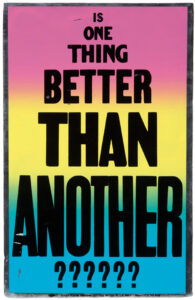Questions of Value: Rethinking the Discourse
of Valuation in Literature and Art
The Louisville Conference on Literature and Culture
Saturday 2:00 PM – 3:30 PM Room: Humanities 109
Chair: Barrett Watten, Wayne State University
Barrett Watten, Wayne State University
“Questions of Value: Poetics as Living Labor
and the Specter of Past Work”
David Kellogg, Coastal Carolina University
“Literary Values after the End of Curation:
Broadening the Scope, Limiting the Claims”
Tyrone Williams, University at Buffalo
“’Bessie, Bop or Bach’: Iconoclasm, Coterie, and/or
Communalism in Montage of a Dream Deferred”
Adeena Karasick, Pratt Institute
“In the Value of the Shadow of. . . : Questions of
Value in 21st Century Art and Literature”
At last year’s Louisville conference, a multi-session discussion was held on the question of literary value and valuation in poetry. This session proposes to develop alternative approaches to literary value and valuation after Barbara Herrnstein Smith’s definitive Contingencies of Value (1991), after which the question of value seemed to settle into relativisms reflecting a plurality of communities, each with distinctive formations of taste. Underlying this discussion, then, is the Kantian sensus communis by which the aesthetic is universally communicable, leading to the Ranciérian politics of the “aesthetic regime.” Examples of value in the previous session, however, were somewhat narrowly constructed: “What thou lovest well remains / the rest is dross,” after Pound, turning into a merely personal valuation of “the best that has been thought or said” or “what I can still remember once all is done,” with Robert Hass’s “Meditation at Lagunitas” frequently cited. This session calls for theoretical models that pursue value and valuation in literature and art in entirely different registers: for example, revisionist accounts of the aesthetic that overturn the agreeable, beautiful, and sublime in Kant and look for other kinds of affect elicited by the work of art and its relation to the natural world; concepts of use, exchange, and labor as value in Marx and their relation to political economy, including modernity and the global economy; and the pluralization of values following Nietzsche’s critique of scientific objectivity, or the “ascetic ideal,” in numerous subsidiary values, extended to other absolutes or givens of the discourse of valuation. For instance, love, spontaneity, impact, reflexivity, power, clarity, tradition, money, existence, the avant-garde may all constitute values that can be further unpacked as discourses of valuation. What kinds of value or valuation go along with poetry apart from the lyric tradition: for instance, in Language writing, conceptualism, hybrid genre writing, writing across languages? How about writing that questions orthodoxies of taste, structures of power, imperial or Eurocentric, raced, classed, or gendered hierarchies? How do positive and negative intersect in valuation? In visual art, how do the economic underpinnings of the art market intersect, comfortably or not, with the political and critical claims of that work; how do works of art construct alternate senses of value and valuation, as with recent global exhibitions? The fundamental questions to be asked, across the literature and art we will consider, are how is the making of the work of art a discourse of value in all senses? and how are the specific conditions of value at a specific historical moments part of the work as value?
Notes
Image: Allen Ruppersberg, Is One Thing Better than Another????, 2010.













